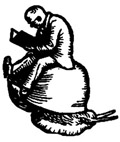|
Egy hymen-hírre
I. Ezt mondja a költő
Tán szebb lett volna úgy, ahogy megírtam:
Özvegyen mindhalálig.
Szőke hajkoronában diadémként
Egy síri mécs világlik.
Tán szebb lett volna úgy, ahogy megírtam.
De hát így is szép. A nő nő marad,
A férfi férfi, és az élet élet,
S a költő azért költő, hogy kisüssön
Az életen is túlnövő meséket.
A mese mese, és az élet élet.
Amit megírtam, mégis csak megírtam.
Az én mesémben a régi marad.
Hiába fon új mirtuszt homlokára
A fellángoló életakarat.
A fantáziám "Özvegy"-e marad.
És most Úristen, kápráztató köddel
Fedj el emléket, szenthegyet és multat.
Adj az élőknek zengő üdvösséget,
Adj a holtaknak csendes nyugodalmat.
Adj a holtaknak csendes nyugodalmat.
2. Ezt mondja a halott
Menj békességgel, szívem asszonya.
Üzenem néked: értem lelki vádat
Egy pillanatig se érezz soha.
Megmérhetetlen csillag-távolokból
Üzenem néked: hogy közel vagyok.
Üzenem, hogy közelgő esküvődön
Boldog örömmel leszek násznagyod.
Az én szívemből már mindent kimostak
Az örökkévalóság vizei.
Elsüllyedtek a kis papír-hajók:
Vágy, féltékenység játékszerei.
Lefoszlott lelkem örök dallamáról
És elhalt minden kísérő zene.
Maradt a dallam maga: szeretet,
És azzal vagyok szinültig tele,
Szeretlek, asszonyom, a túlvilágról,
És áldom azt, ki a földön szeret,
Aki legyőzött engem, győzhetetlent.
Menj békességgel, az Isten veled.
3. Ezt mondja Jézus
“... megkérdék őtet... A feltámadásnak napján azért ezek közül ki felesége lészen az?... ”
Bizony mondom, elmúlik e világ.
És bizony mondom, megmaradok én.
S bizony, ha két szív egy ütemre dobban,
Az egy-ütemben ott dobbanok én.
Bizony mondom, elmúlik a világ.
És bizony mondom, én megmaradok.
S akkor nem két-két szívet kötök egybe,
De a szívekből koszorút fonok.
S mind, aki egymást idelenn szerette,
A csillag-koszorúba bekerül,
S ragyog szerelmük tisztán, szabadon,
Testetlenül és véghetetlenül.
On Hearing News of a Hymen
1. This is what the poet says
It might have been more beautiful as I wrote it:
A widow until death.
In a blond hairpiece for a tiara,
A graveside candle flickers.
It might have been more beautiful as I wrote it.
But it’s beautiful like this, too. The woman remains a woman,
The man a man, life a life,
And the poet is a poet so he can invent
Tales larger than life.
A story is a story, and life, life.
I simply wrote what I wrote.
The ancient lingers in my story.
Uselessly, the burning will to live
Weaves a new laurel crown onto my forehead.
The will remains the Widow of my fantasy.
And now, almighty God, cover up memory,
Holy mountain, and past with dazzling fog.
Grant our ancestors resounding salvation,
Give the dead quiet repose.
Give the dead quiet repose.
2. This is what the deceased says
Go with peace, my love.
I send you a message: I understand the soul’s accusation.
Do not, even for an instant, feel it.
I send you the message from immeasurable distance:
I am close.
I send word that I will happily be
The best man at your approaching wedding.
Eternity’s waters
Already washed everything out of my heart.
The paper boats have sunk,
Playthings of desire and jealousy.
They unraveled from the soul’s everlasting melody
And every harmony dies out.
All that remains is the melody itself: love,
With which I am filled to the brim.
I love you, my wife, from the other world,
And I bless the man who, on earth, loves you.
Who defeated me, invincible.
Go with peace, may God be with you.
3. This is what Christ says
In the resurrection, therefore, whose wife will the woman be?
Luke 20:33
I assure you, this world shall pass.
And I promise you, I shall endure.
And if two hearts throb to a single beat,
In the pulse do I beat.
I assure you, the world will pass.
And I promise you, I will remain.
And then I will not fasten two hearts together,
But braid a crown from these hearts.
And all who loved one another here, on earth,
Shall enter the wreath of stars.
And their love shall glisten unsoiled, free.
Bodilessly, interminably.
continue with the second poem, “The Postman” >
|

